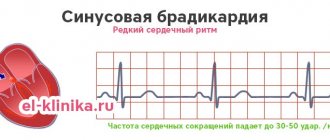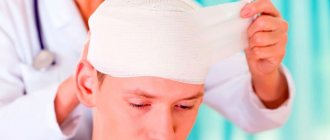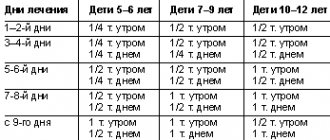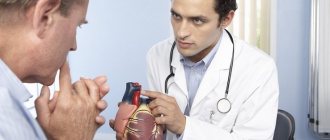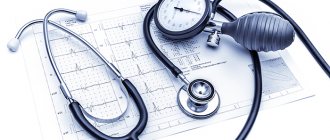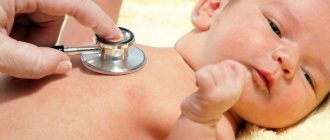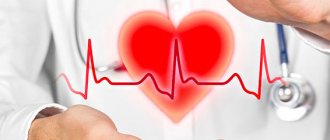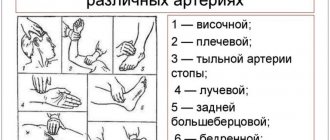Treatment under the compulsory medical insurance policy is possible!
Submit your application
Follow the news, subscribe to our social networks
Details
Heart rhythm disorders (arrhythmias) are conditions in which the heart beats irregularly, too fast, or too slow. With frequent heart contractions - above 100 beats per minute in adults, this condition is called tachycardia, with rare - less than 60 beats per minute, it is called bradycardia. Some types of arrhythmia have no symptoms. If the arrhythmia is symptomatic, then the main complaints are palpitations or a feeling of a pause between heartbeats. Sometimes patients may complain of dizziness, fainting, shortness of breath or chest pain. Most types of arrhythmia are not a serious threat to the patient, but complications such as stroke or heart failure can often occur, and sometimes the arrhythmia can lead to cardiac arrest.
The Innovative Vascular Center employs experienced cardiologists who will help determine exactly why cardiac arrhythmia occurs and prescribe the correct treatment. In addition to drug therapy, our clinic implants artificial pacemakers (pacemakers) of any configuration. Timely and correct treatment allows our patients to avoid many complications, which means prolonging life and improving its quality.
Causes of sinus arrhythmia
Physiological sinus arrhythmia is very common in healthy people. The human heart is sensitive to changes in the functioning of the body and signals from the nervous system. So, during physical activity, the heart rate increases, and during rest it returns to the usual 60 - 80 beats per minute.
The breathing phase also affects the heart rate. On inhalation they become less frequent, on exhalation they become more frequent. Such increases and decreases, in principle, can be characterized as physiological sinus arrhythmia. In children and adolescents, sometimes there is another variant: unequal time intervals between “adjacent” heart contractions. This is a manifestation of the immaturity of the nervous system. As you grow older, it goes away on its own. In addition, athletes and people in good physical condition may have a heart rate less than 60 beats per minute. This phenomenon is called physiological bradycardia, and it can also be called a type of “normal” sinus arrhythmia.
Pathological sinus arrhythmia occurs as a consequence of diseases, including:
- Obstructive sleep apnea syndrome
- Heart diseases
- Nervous system dysfunction (neuroses, vegetative-vascular dystonia)
- Endocrine diseases (thyroid dysfunction, diabetes mellitus)
- Diseases of the respiratory system (bronchial asthma)
- Intoxications (medicines, alcohol)
- Electrolyte disturbances.
Sometimes the cause of sinus arrhythmia cannot be identified.
Case study: a young man with connective tissue dysplasia
I would like to present an unusual case of sinus arrhythmia.
A young man, 24 years old, approached me. Recently, he began to experience discomfort in the heart area and began to experience slight dizziness. The patient does not smoke, does not drink alcohol, and does not take any medications. Body temperature is normal. When I began to measure his pulse, it turned out to be irregular. During a general examination, I noticed that the young man had signs of connective tissue dysplasia - thinness, tall stature, hypermobility of the joints (wrist, elbow, knee). Decoding of the cardiogram - sinus arrhythmia. When holding the breath, the rhythm disturbance persisted. An echocardiogram revealed mitral valve prolapse, which is another criterion for connective tissue dysplasia. A blood test showed a low magnesium concentration. I prescribed Magne B6 and recommended including foods rich in this microelement (buckwheat, bananas, nuts, oatmeal) in the diet. Upon re-appointment, the patient noted a significant improvement in his condition. Manifestations of arrhythmia completely stopped. The cardiogram and magnesium levels returned to normal.
Symptoms and complications of sinus arrhythmia
Physiological arrhythmia usually does not cause any discomfort or consequences.
Pathological sinus arrhythmia can manifest itself in different ways. It most often occurs in three forms: sinus bradycardia, sinus tachycardia and extrasystole.
Sinus bradycardia is characterized by a heart rate below 60 beats per minute at rest. Patients with bradycardia complain of attacks of weakness, dizziness, and pain in the heart area. Periodically they experience fainting. These symptoms can be observed either all together or separately - each patient has individual manifestations. Sinus bradycardia often occurs at night in obstructive sleep apnea syndrome. Against the background of respiratory arrests, the body reflexively seeks to conserve oxygen reserves, and heart activity slows down.
Rare heartbeats lead to the fact that an insufficient amount of blood reaches the organs and tissues, they lack oxygen and nutrients, and this negatively affects their vital functions. Frequent complications of sinus bradycardia include strokes, heart failure, and myocardial infarction. This condition can even cause cardiac arrest (called sudden cardiac death).
Sinus tachycardia is an increase in heart rate, usually up to 120, sometimes up to 150 beats per minute. Its signs are a feeling of rapid heartbeat, squeezing pain in the chest (sometimes), attacks of weakness and dizziness, and loss of consciousness. With sinus tachycardia, the heart fills with less blood than necessary. Blood pressure decreases. The organs (primarily the heart muscle itself) are insufficiently supplied with blood. Sinus tachycardia is often complicated by the development of myocardial infarction and heart failure.
Pathological sinus extrasystole usually manifests itself as a feeling of a sinking heart followed by a strong shock in the chest, or attacks of increased heartbeat. They may be accompanied by pain in the heart area, pale skin, a feeling of anxiety, and lack of air.
Sometimes all these violations are not felt by a person at all.
Slow heartbeat - bradycardia
Bradycardia is a condition where the heart beats so slowly that it cannot pump enough blood to meet the body's needs. If bradycardia is left untreated, it can lead to extreme fatigue, dizziness, or fainting because not enough blood is supplied to the brain. This condition can be corrected by using an electronic pacemaker, which makes the heart beat normally.
Bradycardia occurs for various reasons:
- Sick sinus syndrome
The appearance of sinus bradycardia as a result of a “malfunction” in the sinus node (the natural pacemaker of the heart) occurs when discharges for contractions occur too infrequently. A weak sinus node can develop with age or be a consequence of illness. Some medications may also cause or worsen bradycardia. This arrhythmia may be temporary or permanent. It can be treated with medications or an electronic pacemaker.
- Blockage of the heart pathways
Heart block is a slowing or interruption of the electrical signal to the lower chambers of the heart (ventricles) that cause the heart muscle to contract. The heart's electrical conduction system typically sends signals from the upper chambers of the heart (atria) to the lower chambers (ventricles), which causes coordinated contractions of the heart muscle. Complete blockade of the atrioventricular node can manifest as a sudden loss of consciousness, since the ventricles contract very rarely without stimulus from the sinus node. An artificial pacemaker can eliminate this problem and normalize heart function.
Treatment of sinus arrhythmia
Physiological sinus arrhythmia does not require treatment.
To get rid of pathological sinus arrhythmia, you need to cure the disease from which it is a consequence. Arrhythmia is quite often a symptom of obstructive sleep apnea.
Make an appointment with a somnologist if, in addition to arrhythmia, you have any of the following symptoms:
- Stopping breathing during sleep;
- Snore;
- Restless, unrefreshing sleep;
- Daytime sleepiness, fatigue;
- Excess weight;
- Nighttime suffocation, coughing or waking up from lack of air;
- Morning headache;
- Urinating more than once at night;
- High blood pressure;
- Night sweats;
- Diagnosed diseases of the cardiovascular system (coronary heart disease, heart failure, rhythm disturbances), diabetes mellitus.
If the results of overnight polysomnography reveal that a patient has moderate or severe obstructive sleep apnea, CPAP therapy will effectively help him. This is a hardware treatment method that, from the first night of treatment, eliminates snoring, sleep apnea and heart rhythm disturbances caused by apnea.
For sinus tachycardia, treatment is predominantly medicinal and aimed at reducing the heart rate. For this purpose, sedatives (motherwort, valerian), beta-blockers, etc. are used.
Treatment of sinus bradycardia is aimed at increasing the heart rate. For this purpose, both medications (sympathomimetics, anticholinergics) and implantation of an electrical pacemaker are used for severe bradycardia that threatens the patient’s life.
Sinus extrasystole is treated with antiarrhythmic drugs.
Diagnostics
The main method for diagnosing arrhythmia is electrocardiography, which can be recorded once or throughout the day (Holter monitoring).
In case of arrhythmia, the ECG must have a P wave, indicating that the source of contraction is the sinus node. The heart rate is usually increased or decreased. To exclude the influence of the respiratory cycle on the ECG results, during the manipulation the patient is asked to hold his breath at the height of inspiration.
To exclude organic pathologies of the heart, ECHO-CG is performed. Using ultrasound, you can determine the condition of various structures and measure the dimensions of the chambers. An invasive electrophysiological study involves stimulating or inhibiting the sinus node and assessing its response. It is not performed often and only according to strict indications.
Prevention of sinus arrhythmia
A healthy lifestyle helps prevent the development of various heart rhythm disorders, including sinus arrhythmia. A properly selected diet with a limit on sweets and fatty foods, simple exercise or walking are quite effective means of preventing sinus arrhythmia.
Giving up bad habits is of great importance. The list of diseases caused by drinking alcohol and smoking is far from exhausted by arrhythmias.
To fully prevent sinus arrhythmia, healthy sleep is necessary - sound and of sufficient duration. Various sleep disorders, primarily sleep apnea syndrome, can provoke heart rhythm disturbances. Consulting a somnologist will help solve sleep problems. Typically, these specialists conduct appointments at sleep centers. The leading Russian Center for Sleep Medicine operates on the basis of the Rehabilitation Clinic in Khamovniki at the address: Moscow, st. Efremova, 12с2.
Snoring, apnea, insomnia or other problems? Contact the Sleep Medicine Center at the Rehabilitation Clinic in Khamovniki. We will definitely help you! Ask questions and sign up for a consultation by phone.
Diet for respiratory arrhythmia
The diet should be balanced and varied, with a predominance of raw fruits and vegetables, herbs, dairy products, and fish. It is necessary to limit the consumption of sweet, starchy and too fatty foods, as well as products containing caffeine. Also useful are walks, trips to nature, and engaging in any hobby that will fill the patient’s life with positive emotions and help avoid stress.
What foods are most useful for heart rhythm disorders? Watermelon and melon remove excess cholesterol. Turnips are great for calming heart palpitations. Grapes eliminate swelling and shortness of breath, improve the tone of the heart muscle. Apples reduce the risk of developing tumors, normalize blood pressure, and improve digestion.
Avocado contains enzymes that help the body absorb substances necessary for the correct functioning of the heart. Potatoes and cabbage are sources of potassium, which normalize the functions of the heart muscle. Cereals effectively inhibit the absorption of cholesterol. Pumpkin corrects the water-salt balance and helps reduce blood pressure.
If a person who has been diagnosed with respiratory arrhythmia eats right, devotes time to moderate physical activity and avoids stress, then he will not feel any discomfort.
Sinus arrhythmia during pregnancy
Causes of sinus arrhythmia during pregnancy
Among the processes that cause the development of this pathology, the following can be distinguished:
- the appearance of an additional blood circulation that connects the fetus with the maternal body;
- increased emotionality and reduced stress resistance of the expectant mother;
- high activity of the sympathetic nervous system;
- electrolyte disorders;
- anemia.
Expectant mothers with heart defects are at risk. For them, the risk of developing arrhythmia during pregnancy is very high, even after successful surgery. Heart rhythm disturbances are also very often recorded in women with congenital diseases of the cardiac conduction system.
Symptoms of sinus arrhythmia during pregnancy
The most common signs of this heart rhythm disorder are sensations of frequent beats in the chest, pounding in the temples and dizziness, shortness of breath and high fatigue even with minimal exertion, a frequent and even pulse rhythm without interruptions.
Malfunctions in the heart of the expectant mother can lead to a deterioration in the blood supply to the fetus, and this is fraught with negative consequences for its development. That is why, at the first signs of heart rhythm disturbances, it is necessary to consult a specialist. The doctor, having diagnosed “sinus arrhythmia” based on the ECG and tests, will explain what this means and how to fix the problem.
Complications of sinus arrhythmia during pregnancy
Serious consequences of heart rhythm disturbances include:
- thromboembolism;
- tachycardia;
- heart failure.
Thromboembolism is characterized by the appearance of blood clots as a result of blood stagnation. To prevent blood clots, medications that reduce blood clotting are prescribed.
Tachycardia is accompanied by shortness of breath, weakness and a sharp decrease in pressure. This pathology is due to the fact that the heart, contracting too often, cannot pump the required volume of blood.
Heart failure develops due to the fact that due to disturbances in normal blood circulation, excess fluid is retained in the body. As a result, breathing becomes difficult, gas exchange disorders in the lungs and hypoxia occur.
Treatment of sinus arrhythmia in pregnant women
All substances entering the blood of the expectant mother are transferred to the fetus. Taking medications during pregnancy is permitted only for strict indications.
A pregnant woman needs to control her weight: if she gains more than 300 grams in a week, then she needs to reconsider her diet. It is especially important to limit the consumption of flour, fried and salty foods. As for sports, physical exercises such as walking and swimming, as well as gentle yoga, are recommended during pregnancy.
Sinus arrhythmia during pregnancy requires consultation with doctors of various specialties: cardiologist, gynecologist, pediatrician. Even a slight disturbance in the heart of the expectant mother can provoke oxygen starvation and delayed fetal development. For preventive purposes, it is recommended to undergo examination at the stage of pregnancy planning. If any serious pathology is identified, it will be possible to carry out a course of effective treatment in advance.
To prevent heart rhythm disturbances during pregnancy, measures such as a balanced diet, avoidance of caffeine-containing products, and moderate exercise are necessary. You should also avoid stressful situations and nervous tension.
Pharmacies where you need to search for medications are located on our website in the “Pharmacy” tab. There you can book medical products online and see all the necessary information about them, the types of available dosages.
